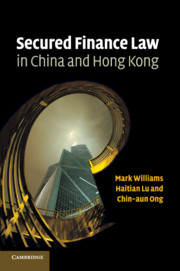Book contents
- Frontmatter
- Contents
- Preface
- Table of cases
- Table of legislation
- 1 Introduction
- 2 Security over tangible personal property
- 3 Security over intangible personal property
- 4 Company security over personal property
- 5 Hire-purchase, leasing and conditional sale of tangible personal property
- 6 Priority of security interests over personal property
- 7 Enforcement, and creditor's remedies
- 8 Conclusion
- Index
- References
2 - Security over tangible personal property
Published online by Cambridge University Press: 03 May 2011
- Frontmatter
- Contents
- Preface
- Table of cases
- Table of legislation
- 1 Introduction
- 2 Security over tangible personal property
- 3 Security over intangible personal property
- 4 Company security over personal property
- 5 Hire-purchase, leasing and conditional sale of tangible personal property
- 6 Priority of security interests over personal property
- 7 Enforcement, and creditor's remedies
- 8 Conclusion
- Index
- References
Summary
Introduction
In Hong Kong, the types of consensual security device that can be created over tangible personal property are the legal mortgage strictu sensu, equitable mortgage, charge, pledge and trust receipt. The creation and perfection of these security devices are governed by the rules of common law, equity and legislation. Publicity, on the other hand, is mainly governed by legislation, namely the Bills of Sale Ordinance (Cap. 20) and the Companies Ordinance (Cap. 32); both are very specific in their application. The former applies to security over certain types of tangible personal property created by non-corporate debtors. It indirectly applies to companies via §80(2) of the Companies Ordinance, which strictly applies only to companies. Section 80(2) provides that where a security in writing granted by a company (that is, if executed by a non-corporate debtor) requires registration to constitute a bill of sale, the security is registrable with the Companies Registry. This chapter concentrates on security over tangible personal property granted by non-corporate debtors.
In contrast, at present China has five types of consensual security device over tangible personal property, all clearly stipulated in legislation, namely mortgage, pledge, deposit, lien, charge and trust receipt. The creation, perfection and publicity of these security devices are governed by legislation, related judicial interpretations, administrative regulations and government circulars. The most important amongst them is the Security Law enacted in 1995, and its related judicial interpretations issued by the Supreme Court in 2000; however, as previously mentioned, the relevant provisions of the recently enacted 2007 Property Law take priority.
- Type
- Chapter
- Information
- Secured Finance Law in China and Hong Kong , pp. 36 - 93Publisher: Cambridge University PressPrint publication year: 2010



